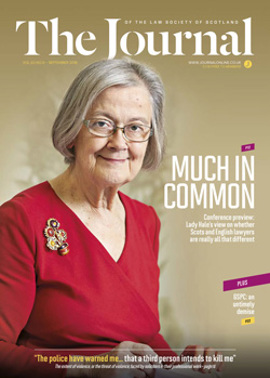Relevant persons: a challenge

ABC v Principal Reporter [2018] CSOH 81 was something of a novel case, but its interesting point was that a direct challenge was taken to the ECHR compatibility of the test for a relevant person in the context of children’s hearings, by means of judicial review proceedings in the Court of Session. The case entailed very detailed and complex arguments, with a judgment running to 58 sides of A4, and this article is not intended to cover every single submission that was made.
ABC attempted to lodge an appeal against the panel decision of 7 September 2017, in terms of s 154 of the Children’s Hearings (Scotland) Act 2011, but the appeal was incompetent.
The hearing on 5 December 2017 was convened to review DEF’s compulsory supervision order (“CSO”) and also in relation to the contact directions, including between DEF and ABC. The reporter invited ABC to attend, while stating that it was a matter for the chairman to decide for how long ABC could stay.
On 5 December, the panel continued the CSO in relation to DEF and varied the directions in relation to contact between the siblings. Once again ABC was not provided with the papers and other information that were to be before the panel hearing that day. Although ABC was advised of the outcome of the hearing, he was never provided with written confirmation or reasons for the decision.
Compliant test?
Broadly speaking, ABC argued that given his lack of involvement in the hearings, the interference with his right to family life was accordingly unlawful. It was submitted further that ABC and DEF had the right to respect for their family life, and this was not restricted to maintaining a reasonable relationship. The lack of locus on ABC’s part meant that he had been unable to lodge an appeal against panel decisions at the appropriate sheriff court.
Section 79(2)(a) of the 2011 Act states that the reporter must refer the issue of relevant person status if requested. The petitioner argued, however, that he could not satisfy the test of having a “significant involvement in the upbringing” of DEF. The new “relevant person” test in s 81(3) of the Act was much narrower than the previous test as read down by the UK Supreme Court in Principal Reporter v K [2010] UKSC 56. ABC could not bring himself within the definition of “relevant person” because the test indicated the need to be acting in a parental role.
Counsel for the Scottish Children’s Reporter Administration (SCRA) argued that a chaotic situation would result if every single sibling was to fall within this definition. The wording of the “relevant person” test was capable of including somebody in ABC’s position: “involvement in” was broader than “responsibility for”, and ABC could have applied to be treated as a relevant person. In Principal Reporter v K, it was stated that it was not every involvement in the life of a child that called for the procedural protection of constituting the individual as a party to the proceedings. Strasbourg jurisprudence had nothing to say about the requirement to involve siblings in care proceedings. If A’s argument succeeded, SCRA would have to consider each and every sibling in a family and write to each one every time there was to be a review. That would create a significant burden on SCRA. Also, it might breach the child’s right to privacy and confidentiality in proceedings.
On behalf of the Lord Advocate, the third respondent, it was contended that in relation to the issue of locus standi, the Human Rights Court had confirmed that parents in conflict with the authorities could represent their children where the concern was that those children’s article 8 rights might be breached. Counsel for ABC’s father, however, correctly highlighted that given ABC had legal capacity, his parents could not act for him in the obvious absence of his consent. He also pointed out that the “relevant person” test had already generated three Inner House decisions and one of the Sheriff Appeal Court, and advised that further decisions were to follow. The test had been causing problems; in essence, ABC’s difficulty was that he had no contact order and could not satisfy the test. Potentially in response to any confidentiality issues, or causing the child potential distress, counsel also highlighted that s 178 of the Act allowed SCRA to withhold reports from the subject child, but not from a relevant person – accordingly anyone falling within the definition of “relevant person” would see these reports, whether this was appropriate or not. Someone in ABC’s position could not trigger the holding of a hearing; but someone in ABC’s position could only be notified of a hearing if he met the test.
Reading down
Lady Wise rejected the submission that Principal Reporter v K could not be read across to the 2011 Act. In her Ladyship’s view, what actually mattered was that the actual relationship with the child was at risk in the proceedings, not the class or category of that relationship. Decisions since the commencement of the 2011 Act did not suggest that there should be any departure from that inclusive approach. She did not accept that s 200 of the 2011 Act (those automatically included as relevant persons) was ECHR-incompatible.
Various declarators of incompatibility were sought, but were ultimately refused on the basis of being unnecessary and inappropriate. However, Lady Wise concluded that the test in s 81(3) was “unduly narrow”, and considered that (in line with Principal Reporter v K) the words “or persons whose established family life with the child may be interfered with by the hearing and whose rights require the procedural protection of being a relevant person” should be read as appearing after the words “upbringing of the child” in that provision. A by order hearing was fixed to, among other things, consider the specific wording further. Ultimately, in light of this decision, ABC will now be able to invoke the provisions of ss 79-81 of the 2011 Act.
Over to SCRA
Overall, this decision in my view provides much clarity around the interpretation of s 81(3). Having been instructed in regard to a number of appeals on this point (with one in the Sheriff Appeal Court at present), from my own experience what is and what is not a relevant person has caused much complication and confusion in the past. There is often an inclination on the part of panel members to adopt a dictionary approach to the definition, but to apply the test in a rather subjective way. Clearly that is not the proper approach; where it has happened, it tends to lead to skewed decisions and potentially the outcome of the matter being appealed to the sheriff. In theory at least, now that matters have been clarified, there should be far less room for doubt or confusion.
In the absence of any contradictory authority being produced, SCRA will almost certainly have to look at their own guidelines in terms of what truly constitutes a relevant person for the purposes of children’s panel hearings. Hopefully the decision will likewise assist social workers in terms of any recommendation that they make, or indeed if they are to express a view as to whether a person can meet the test or not. One can similarly hope it means that solicitors will be able to advise their clients appropriately. Given that Lady Wise effectively endorsed the approach in Principal Reporter v K, this should avoid panel members overlooking a person’s right to a private and family life within the context of the test, and focus minds more firmly as to whether or not a person can satisfy the criteria.
Watch this space.
Lady Wise’s decision has been reclaimed by the child, and SCRA and the Scottish ministers are counter-reclaiming. The appeal is to be heard by the First Division on 29 October.
In this issue
- Confidence restored: internal investigations and legal privilege
- Court reforms: still an unknown quantity
- Ruled out of court?
- Uncovering the environment (1)
- Medical death: a case to answer
- Reading for pleasure
- Opinion: Kerry Trewern and Rhona McNair
- Book reviews
- Profile: Ryan McCuaig
- President's column
- Developing digital services
- People on the move
- Leading judgment
- Health check
- Open to attack
- Claims: beating the trigger
- Storage: time for digital
- GSPC: eulogy for a friend
- Relevant persons: a challenge
- New specialist land registration practice launches
- Good enough reason?
- Copyright: underpinning control
- Writing means writing
- Rent moves: two crucial hoops
- Debtor wins in policy decision
- Scottish Solicitors' Discipline Tribunal
- KIR: the time bomb explodes
- The guideline goal
- GC NextGen: a network for you?
- Your Law Society of Scotland Council members
- Public policy highlights
- Double boost for Society's AML team
- Ask Ash
- Practice rights and the impact of Brexit: working in the EU
- Acting as notary: what do I need to know?
- Engagement letters: a practical approach
- Uncovering the environment
- Paralegal pointers






